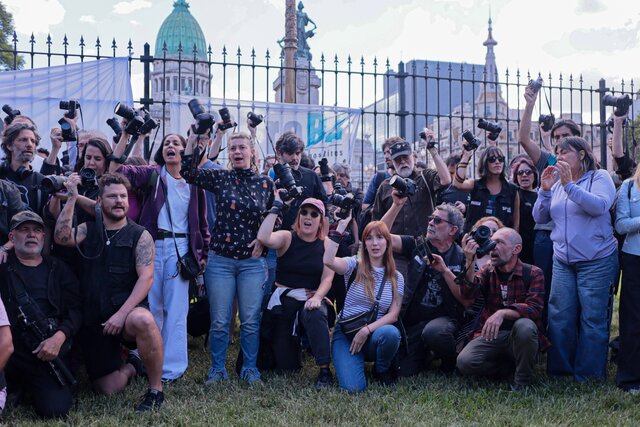Between independence and survival. Economic pressure brings global press freedom to ‘unprecedented’ low in 2025, says Reporters Without Borders
Manage episode 480281722 series 3381925

The state of press freedom worldwide has reached an “unprecedented, critical low” this year due to economic pressure, according to the annual World Press Freedom Index from Reporters Without Borders (RSF). According to the 2025 Index, the average country scored less than 55 out of 100 possible points, placing global press freedom in a “difficult situation” per RSF’s classification. Russia, with its largely state-controlled media and strict wartime censorship, scored below 25 points, ranking 171st among the 180 countries and territories evaluated.
RSF has warned of a worldwide decline in press freedom for more than 10 years — but the results of its 2025 Index mark an all-time low. “Of the five main indicators that determine the World Press Freedom Index, the indicator measuring the financial conditions of journalism and economic pressure on the industry dragged down the world’s overall score in 2025,” this year’s report says.
The 2025 Index describes economic pressure as “more insidious” than physical attacks on journalists, noting that media outlets are shutting down for financial reasons in nearly a third of countries globally. “Much of this is due to ownership concentration, pressure from advertisers and financial backers, and public aid that is restricted, absent, or allocated in an opaque manner,” the report explains. “Today’s news media are caught between preserving their editorial independence and ensuring their economic survival.”
As the report notes, many shutdowns this year have been a knock-on effect of the Trump administration’s sweeping cuts. While halting funding for the U.S. Agency for Global Media affected several newsrooms with massive international reach, including Voice of America and Radio Free Europe/Radio Liberty (RFE/RL), freezing funding for the U.S. Agency for International Development (USAID) cut off international aid, “throwing hundreds of news outlets into a critical state of economic instability and forcing some to shut down — particularly in Ukraine.”
READ MORE ABOUT RFE/RL
Loss of advertising revenue has also had a negative economic effect on media globally, with tech giants like Google, Apple, Facebook, Amazon, and Microsoft “absorbing an ever-growing share of advertising revenues that would usually support journalism,” the report says.
The Kremlin crushed Meduza’s business model and wiped out our ad revenue. We’ve been blocked and outlawed in Russia, where donating to us or even sharing our posts is a crime. But we’re still here — bringing independent journalism to millions of our readers inside Russia and around the world.
Meduza’s survival is under threat — again. Donald Trump’s foreign aid freeze has slashed funding for international groups backing press freedom. Meduza was hurt, too. It’s yet another blow in our ongoing struggle to survive.
You could be our lifeline. Please, help Meduza survive with a small recurring donation.
“Media ownership concentration is another key factor in the deterioration of the Index’s economic indicator and poses a serious threat to media plurality,” RSF notes. “Data from the Index shows that media ownership is highly concentrated in 46 countries and, in some cases, entirely controlled by the state.”
This is certainly the case in Russia, where state-controlled media dominate. Against the backdrop of the war in Ukraine, the Kremlin has continued to crack down on press freedom domestically, imposing strict military censorship, blocking independent media sites en masse, and blacklisting journalists and news outlets as “foreign agents” or “undesirable organizations.” According to RSF, 38 journalists and media workers are imprisoned in Russia today.
Russia scored less than 25 points in this year’s Index, making it one of the 42 countries RSF categorizes as in a “very serious” situation in terms of press freedom. This put Russia near the bottom of the overall ranking, with the country dropping nine places to 171st (out of 180).
“For the first time in the history of the Index, the conditions for practicing journalism are ‘difficult’ or ‘very serious’ in over half of the world’s countries and satisfactory in fewer than one in four,” RSF notes.
Other former Soviet countries that fell into the “very serious” category include Turkmenistan (174th place), Azerbaijan (167th), Belarus (166th), Tajikistan (153rd), Uzbekistan (148th), Kyrgyzstan (144th), and Kazakhstan (141st). RSF describes Belarus — where 46 journalists and media workers are currently in prison — as “Europe’s most dangerous country for journalists until Russia’s invasion of Ukraine.”
Ukraine ranked 62nd in the 2025 Index, maintaining a “diverse and resilient” media landscape despite the ongoing war. RSF notes that while oligarchic influence over the media has diminished since the 2022 invasion, the state has emerged as a “central player” in the industry. At the same time, independent outlets continue to provide reliable information. In Russian-occupied territories, however, “Ukrainian media is being silenced and replaced by Kremlin propaganda.”
READ MORE ABOUT JAILED RUSSIAN JOURNALISTS
64 episodes




